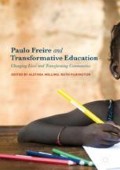Abstract
Scottish universities do not have systematic and articulated programmes for community engagement. In spite of some valuable experiences, Scotland still faces the challenge to mobilise their universities to do more in relation to inequalities and social justice. These challenges inevitably involve a reflection upon the way institutions engage with the social justice agenda. This is particularly relevant for the universities as they are institutions addressing research and teaching and, ultimately, the formation of professionals. In times of instrumentalisation of learning, universities’ agendas for social justice should involve the responsibility of educating students to perform a morally responsible political authority (Giroux, Educar Curitiba 37:25–38, 2010).
Access this chapter
Tax calculation will be finalised at checkout
Purchases are for personal use only
Notes
- 1.
By the time this paper was written the video-documentary was being edited.
References
Barker, D. (2004). The scholarship of engagement: A taxonomy of five emerging practices. Journal of Higher Education Outreach and Engagement, 9(2), 123–136.
Cornwall, A., & Jewkes, R. (1995). What is participatory research? Social Science & Medicine, 41, 1667–1676.
Davies, B. (2003). Death to critique and dissent? The policies and practices of new managerialism and of ‘evidence-based practice’. Gender and Education, 15(1), 91–103.
De Sousa Santos, B. (2007). Beyond abyssal thinking: From global lines to ecologies of knowledges. Review (Fernand Braudel Center), 30(1), 45–89. Retrieved from http://www.jstor.org/stable/40241677.
De Sousa Santos, B. (2011). A Universidade no Século XXI. São Paulo: Cortez.
Farkas, N. (1999). Dutch science shops: Matching community needs with university R&D. Science Studies, 12(2), 33–47.
Fernandes, F. L. (2012). The youth from favela. Reflections on socio-spatial control and enclosure of the urban outcasts in Rio de Janeiro. Convergencia: Revista de Ciencias Sociales, 19(52), 159–186.
Fernandes, F. L. (2014, April). Finding the ‘Scottish way’ to engage universities with civil society: Exploring possibilities between ‘university extension’ and ‘science shops’ models. Accepted paper (not presented), The Living Knowledge Conference, Copenhagen.
Fernandes, F. L., & Rodriguez, A. (2015). The “lost generation” and the challenges in working with marginalised groups. Learnt lessons from Brazilian Favelas. Radical Community Work Journal, 1(1).
Fernandes, F. L., & Sharp, G. (2015). The situation of people who are at risk of homelessness in the city of Dundee. Dundee Drop In Survey. Final report. University of Dundee; Dundee Drop In Services; Faith in Community Dundee.
FORPROEX. (2012). Política Nacional de Extensão Universitária. Manaus: Fórum de Pró-Reitores de Extensão das Universidades Públicas Brasileiras.
Freire, P. (1983). Educação e Mudança. Rio de Janeiro: Paz e Terra.
Freire, P. (2006). Extensão ou Comunicação? Rio de Janeiro: Paz e Terra.
Freire, P. (2012). Pedagogia do Oprimido. Rio de Janeiro: Nova Fronteira.
Gabbay, J., et al. (2003). A case study of knowledge management in multiagency consumer-informed ‘communities of practice’: Implications for evidence-based policy development in health and social services. Health: An Interdisciplinary Journal for the Social Study of Health, Illness and Medicine, 7(3), 283–310.
Geoff, M. (2005). Government, knowledge and the business of policy making: The potential and limits of evidence-based policy. Evidence and Policy, 1(2), 215–226.
Giroux, H. (2010). Educação superior para que?? Educar Curitiba, 37, 25–38.
Giroux, H. (2011). On critical pedagogy. New York: Continuum.
Giroux, H. (2012). The disposable youth. Racialized memories, and the culture of cruelty. London: Routledge.
Giroux, H. (2014). The neoliberalism’s war on higher education. Chicago: Haymarket Books.
Holmwood, J. (2011). The idea of a public university. In J. Holmwood (Ed.), A manifesto for the public university. London: Bloomsbury.
Jezine, E. (2004). As praticas curriculares e a extensao universitaria. Belo Horizonte: Anais do II Congresso Brasileiro de Extensao Universitaria.
Moriarty, P. (2011). Science as a public good. In J. Holmwood (Ed.), A manifesto for the public university. London: Bloomsbury.
Oliveira, C. H. (2004, September 12–15). Qual é o Papel da Extensão Universitária? Algumas Reflexões Acerca da Relação entre Universidade, Políticas e Sociedade. Paper presented at the 2° Congresso Brasileiro de Extensão Universitária, Belo Horizonte.
Piggin, J., Jackson, S. J., & Lewis, M. (2009). Knowledge, power and politics. Contesting ‘evidence-based’ national sport policy. International Review for the Sociology of Sport, 44(1), 87–101.
Schensul, J. J. (2010). Engaged universities, community based research organisations and third sector science in a global system. Human Organisation, 69(4), 307–320.
Sclove, R. E. (1995). Putting science to work in communities. Chronicle of Higher Education, 41(29): B1–B3. Available at www.loka.org/pubs/chron.html
Silva, J. S. (2012). Para uma pedagogia da convivência na cidade. In J. S. Silva et al. (Eds.), O Novo Carioca. Rio de Janeiro: Morula.
Tyler, I. (2013). Revolting subjects: Social abjection and resistance in neoliberal Britain. London: Zed Books.
Wacheder, J. (2003). Democratizing science: Various routes and visions of Dutch science shops. Science, Technology & Human Values, 28(2), 244–273.
Author information
Authors and Affiliations
Editor information
Editors and Affiliations
Copyright information
© 2018 The Author(s)
About this chapter
Cite this chapter
Fernandes, F.L. (2018). Chapter 1.6: What Should the Public Role of Universities in an Unequal Society Be?. In: Melling, A., Pilkington, R. (eds) Paulo Freire and Transformative Education. Palgrave Macmillan, London. https://doi.org/10.1057/978-1-137-54250-2_7
Download citation
DOI: https://doi.org/10.1057/978-1-137-54250-2_7
Published:
Publisher Name: Palgrave Macmillan, London
Print ISBN: 978-1-137-54249-6
Online ISBN: 978-1-137-54250-2
eBook Packages: EducationEducation (R0)

